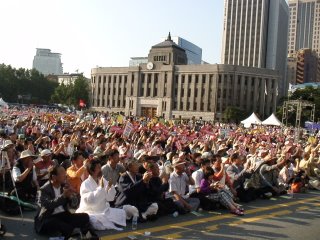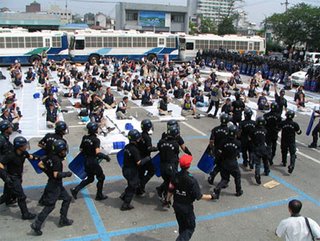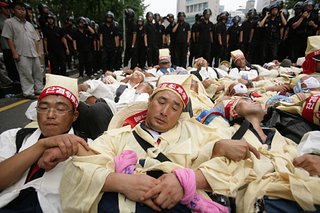There has recently been a few interesting initiatives to fight the proliferation of bilateral agreements, including more information sharing between movements in different countries (something also facilitated by the great site
. I'll reprint their post below.
During July 27-29, 2006, FTA Watch, GRAIN and Bilaterals.org organized the first ever international workshop to make a strategic analysis of the struggles against FTA in Bangkok, Thailand. Participants come from social movements that are struggling against FTAs or bilateral trade agreements in 19 countries. For example: Costa Rica
Costa Rica lies in the United States’ backyard. Although the government agreed behind closed doors to sign the Central American Free Trade Agreement or CAFTA, a large coalition of the public are against it. The people learned from the devastating experience of Mexico after it signed the NAFTA and Chile after they signed an FTA with the US. So they mobilized and put pressure on their government until Parliament refused to approve the terms of the Agreement. As a result, CAFTA is not currently effective in Costa Rica.
“Costa Rica has 4 public universities. Of these, three universities decided take a stand together against the signature of the FTA. The State Ombudsman is another organization which has taken a stand against the FTA. A former president and other senior political figures are also clearly opposed to the deal. Artists organized cultural events to strongly oppose FTAs. Finally, the parliament had to disapprove the deal”, Maria Eugenio Trejos from Pensamiento Solidario said.
Colombia
Although Colombia has a high degree of intervention by the US, the people came out strongly against the FTA with the US. “On august 12, 2004, we mobilized a million people in the capital city. Indigenous people blocked the highways. The government shot people. Over six hundred people were injured and 6 people were dead. However, we were able to bring the FTA with the US under the scrutiny of the parliament. And there will be a vote in October” Aurelio Suarez from Asociacion Nacional por la Salvacion Agropecuaria (ANSA) said.
Phillippines
The government is in a hurry to negotiate and sign an FTA with Japan, but the people, not even the parliamentarians, have never received any information about the terms of the negotiations. Parliamentarians and civil society made an appeal to the Supreme Court because the signing of the FTA with Japan is a violation of the Constitution. Until now, the government cannot sign the FTA yet.
Mario Aguja, a parliamentarian of Akbayan political party said, “We drafted an appeal to the court saying workers will be affected. Farmers will be affected. We want information. As a parliamentarian, we have to protect people. Without information, how could we protect our people? We also started a campaign on this violation of the Constitution”
South Korea
The second round of negotiations with the US were recently closed beforeschedule because of the massive protest of almost one hundred thousand demonstrators and a one-day strike from labour unions throughout the country. Choi Jae Kwan, a delegate from the Korean Peasants League, said, “when we started our campaign, a survey found that only 20% opposed the FTA because most of them did not know anything about the FTA, hence they were neutral. But when over 300 economists and other academics joined the team to carry out a whole range of research studies for 3 months, resultingin a 700 page publication distributed to the public, there was a lot of interest. The latest poll shows that 52% now oppose the FTA. In the latest demonstration, representatives from 14 sectors such as agriculture, industry, public health, cinemas, music, media, education, consumers, etc were gather into a network with alliances at regional level. There were campaign tours throughout the country, organizing cultural festivals and seminars in every province.
Since March 2002, Robert Zoellick, the United State Trade Representative (USTR) at that time, reported to the finance committee of the US senate that the US will use bilateral trade negotiations as a tool to ensure American’s benefit around the world.
FTA or a bilateral trade agreements are being used as a new mechanism to guarantee benefits of the US in accessing resources and markets of other countries, and control over foreign economies together with international financing orgnizations like World Bank, IMF, and Development Banks in different regions. The aid and assistance by developed countries through organisations like USAID also pushes forward neoliberalist policies together with the expansion of power and military influence over important strategic points of the US around the world.
It is now clear that the FTA is not simply a matter of trade, but a political apparatus of the powerful US to expand its new brand of imperialism, in order to take over, trade, control investment and national resources of countries in different part of strategic areas around the world as we have seen from the experiences of countries in Central and South America, Pakistan, South Korea, Thailand and Philippines. Another important point is that countries negotiating FTAs with the US will have to support the US’s foreign policies especially war against terrorism, whereby they have to send their troops to Iraq and suppress people using labels such as “terrorists”.
However, the US is not the only country trying to expand its neoimperialism. The European Union, China, Japan and even India which is a new-born superpower, are also trying to move their policy into the same direction. This has a great effect over small countries whereby small entrepreneurs, communities, women, children and environment are severly affected.
These superpowers use “divide and conquer”tactics both at international and regional levels to pressure each country to conclude the negotiations as soon as possible in competition with each other. These agreements divide society into opposing sectors such as between exporters who gain from more exports, consumers who get short term gains of cheap imported products, patients who will have to buy expensive medicines, workers who are exploited and farmers who only await for the collapse.
The outstanding characteristic of an FTA is that every country faces is the secrecy of the negotiations, no matter how developed or democratic that country is, as happening in Canada, Australia, New Zealand and South Korea. In the recent case of FTA negotiations in South Korea, the government of the South Korea has agreed to keep the negotiation texts out of the public eyes for 3 years from the date the agreement is effective. This is nothing but non-transparent, non-democratic and excludes the participation of the people. Therefore, civil societies in countries are standing up and demanding the right to participate and access information. However, available information is still limited and some governments also employed violence means to suppress demonstrators. “If it is supposed to benefit us why wont they tell us what is being negotiated?”
One outstanding feature of the negotiations is that the government in each country will try to exaggerate the benefits of FTAs as in the case of South Africa, the government publicized the FTA as a “train to heaven”, driving South Africa to join highly developed countries’rank. However, the experiences of countries already signed FTAs such as Chile and Australia revealed that the real benefits were over-estimated and in some cases the impacts were worse. In Chile, FTAs caused a loss of land, an amendment of national legislation so as to promote privatisation of basic infrastructure and utilities including water. This means, piped water, drinking water, sea water, water in reservoirs and water in rivers, altogether 80% of water in Chile now belongs to private companies. Even the ocean has been privatized.
For Australia where Australia-US FTA has already been implemented for one and a half years, there was a study showing that only 1 year after FTA came into force, the exports of Australia in fact decreased by 5% and instead its trade deficit increased by 5%. This is not what the Australians were promised. The US tried to change the legislation on intellectual property rights and the Pharmaceutical Benefit Scheme (PBS) of Australia which will result in a higher price of medicines. At the same time, the local pharmaceutical companies have moved to other countries because they could not compete with imported products from the US. These impacts have helped to raise some awareness of the people on the FTA, leading to a demand to revise the terms of the FTA with the US, and an opposition to the upcoming FTA negotiations with China.
The experiences of different countries show that when information is disseminated, and when research and analysis are carefully done with economic, social, cultural and political dimensions, and research, people soon become aware of how FTA will impact different sectors. Until then, a powerful opposition will take place. Costa Rica whose government already signed up to the CAFTA has seen a movement to stop the approval of the FTA due to popular protest. In Philippines, the government has not been able to sign an FTA with Japan as a court case claiming it is a violation of the Constitution has been filed. In Colombia, academic institutions and other independent organisations jointly declared their position against FTA while in South Korea, Thailand and Ecuador, people have successfully used information to campaign and have been able to delay the negotiations and signatory.
From the exchange of civil society’s experience in 19 countries throughout the three-day workshop, leaders of people movements have agreed to form a network to exchange information, synthesise the experiences, and conduct analysis and joint research on impacts, hidden agendas and tactics of governments in convincing their people with the FTA. Moreover, they will keep monitoring transnational corporations and other capitalists that are a driving force of the FTA negotiations. And they will continue fighting together in solidarity.
(30 July/Bangkok, Thailand)
Participants are from 19 countries: Mexico, Costa Rica, Nicaragua, Columbia, Chile, Ecuador, Argentina, Morocco, Senegal, Mozambique, South Africa, Canada, Australia, New Zealand, Pakistan, South Korea, Indonesia, Philippines and Thailand






